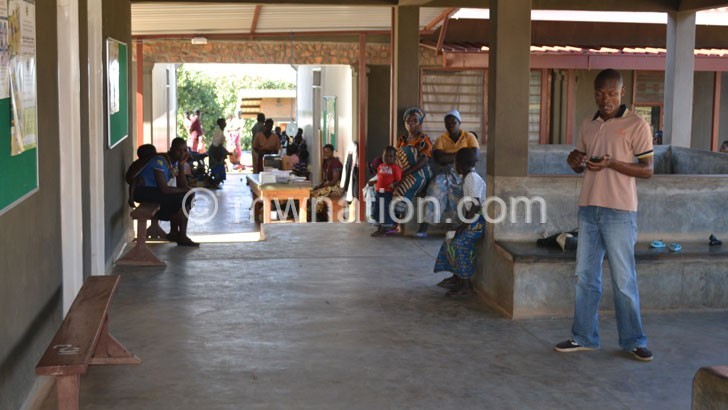WHO warns on local health financing
The World Health Orgnisation (WHO) has slammed low income countries, including Malawi, for not prioritising domestic health financing, depending on donors who provide high levels of external funding for the sector instead.
While neighbouring Zambia shines in low-middle income countries where they are transitioning to domestic health funding, Malawi is stuck on dependency with other countries such as Tanzania, Mozambique and Zimbabwe.

In a report titled Public Spending on Health: A closer Look at Global Trends released Wednesday in Geneva, Switzerland, WHO has put Malawi and its neighbours in the red zone on public spending on health.
Minister of Health Atupele Muluzi is on record as having said the sector is largely financed by development partners at 62 percent of Total Health Expenditure (THE), with the government providing 25 percent.
During the 2017/18 joint annual review meeting last October in Lilongwe, Muluzi said out-of-pocket expenditures cover nine percent while voluntary health insurance covers the remaining four percent of local health financing.
According to the WHO report, such dependency, even in the face of economic growth in low income countries like Malawi, has not translated into increased local funding for the health sector.
It says: “In low income countries, economic growth and more public spending were not accompanied by higher allocations for health. Despite steady growth in GDP and public spending, public spending on health as a share of general public spending declined from 7.9% in 2000 to 6.8% in 2016.
“This may be attributable to increases in external aid for health. Governments that received high levels of external funding for health tended to prioritise health less in their spending from domestic sources. However, health prioritisation increased sharply in 2016. Ongoing tracking is needed to determine whether this is the start of a new trend.”
Malawi signed up to the Abuja Declaration, committing to spend at least 15 percent of its national budget on health.
But a 2016/17 Unicef Health Budget Brief indicates that while allocations to the sector increased in nominal terms, health spending as a percentage of the national budget had declined from 12 percent in 2013/14 financial year to nine percent in 2016/17 budget.
Mainly, this was attributed to reduction of funding to the National Aids Commission (NAC), which in 2013/14 fiscal year was almost one third of the health sector budget.
Malawi surpassed the Abuja target of 15 percent in 2007/8 (16.6 percent), 2009/10 (15.1 percent) and 2010/11 (15.8 percent) when the sector was apportioned K45 billion.
In the 2013/14 budget, Capital Hill allocated about K76.2 billion to health as a sector, representing 12 percent of the total budget, but the actual figure directly injected to the Health Ministry was K42.685 billion, a meagre 6.5 percent of the national budget.
In the following fiscal year, the sector got a K65 billion allocation, translating into 8.8 percent of the K742 billion budget.
But government showed commitment to the health sector by increasing overall allocations in nominal terms by 27 percent and 4 percent in real terms from the 2015/16 approved estimate of K81 billion, to K103 billion in the 2016/17 approved budget.
“The upward change was driven by an increase in the budget for operational costs (Other Recurrent Transactions), amounting to K22 billion,” reads the Unicef brief.
In the current fiscal year, the health sector has been allocated K122 billion, representing 10.7 percent of the total budget.
The Malawi Health Sector Strategic Plan (2017-2022) corroborates that health care financing in Malawi remains unsustainable and unpredictable.
“During the period 2012/13 to 2014/15, development partners’ contributions accounted for an average 61.6% of total health expenditure, government accounted for an average of 25.5% and households 12.9% of THE,” it states.
Health rights activist Maziko Matemba said in an interview yesterday the trends in Malawi on health financing were scary, stating the country is putting itself at risk.
He said: “The bigger question now should be on how we reduce donor dependency and increase domestic resources. This issue is risky and unsustainable. Even donor countries supporting Malawi think we are relaxing.”
On GDP, according to the Unicef brief, total expenditure on health as a percentage of GDP in Malawi stood at 11.1 percent, the highest in the Southern Africa Development Community (Sadc) region.
Asked why the country is failing to meet the Abuja Declaration requirements, Secretary to Treasury Cliff Chiunda said the Ministry of Health was better placed to respond.
He said: “This is a sectoral issue, we are only on the receiving end. It’s the ministry [of Health] that is trying to achieve that. Of course it’s government and we are together, but mostly it’s the ministry.”
On his part, MoH spokesperson Joshua Malango admitted deficiencies in financing the sector, but said Capital Hill is looking into the matter.
“There is still discussion on increasing domestic resources into health. Options include a Health Fund but also in looking at what it would take to have health insurance to which there is need for further consultations, especially with communities. The discussions are happening and we are hoping that soon, it will be done,” he said.
The WHO report has since recommended that in low income countries, more attention is needed to prioritising health in domestic budgets and to better exploit economic growth to increase health spending as countries transition from external aid.
It adds: “To achieve the SDG targets for health, and to leave no one behind, public spending needs to be more effective in improving access to services, equity in access and financial protection.”





